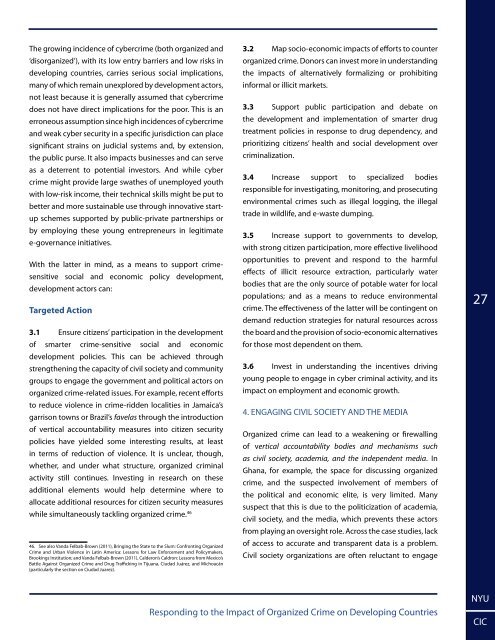here - Center on International Cooperation - New York University
here - Center on International Cooperation - New York University
here - Center on International Cooperation - New York University
You also want an ePaper? Increase the reach of your titles
YUMPU automatically turns print PDFs into web optimized ePapers that Google loves.
The growing incidence of cybercrime (both organized and<br />
‘disorganized’), with its low entry barriers and low risks in<br />
developing countries, carries serious social implicati<strong>on</strong>s,<br />
many of which remain unexplored by development actors,<br />
not least because it is generally assumed that cybercrime<br />
does not have direct implicati<strong>on</strong>s for the poor. This is an<br />
err<strong>on</strong>eous assumpti<strong>on</strong> since high incidences of cybercrime<br />
and weak cyber security in a specific jurisdicti<strong>on</strong> can place<br />
significant strains <strong>on</strong> judicial systems and, by extensi<strong>on</strong>,<br />
the public purse. It also impacts businesses and can serve<br />
as a deterrent to potential investors. And while cyber<br />
crime might provide large swathes of unemployed youth<br />
with low-risk income, their technical skills might be put to<br />
better and more sustainable use through innovative startup<br />
schemes supported by public-private partnerships or<br />
by employing these young entrepreneurs in legitimate<br />
e-governance initiatives.<br />
With the latter in mind, as a means to support crimesensitive<br />
social and ec<strong>on</strong>omic policy development,<br />
development actors can:<br />
Targeted Acti<strong>on</strong><br />
3.1 Ensure citizens’ participati<strong>on</strong> in the development<br />
of smarter crime-sensitive social and ec<strong>on</strong>omic<br />
development policies. This can be achieved through<br />
strengthening the capacity of civil society and community<br />
groups to engage the government and political actors <strong>on</strong><br />
organized crime-related issues. For example, recent efforts<br />
to reduce violence in crime-ridden localities in Jamaica’s<br />
garris<strong>on</strong> towns or Brazil’s favelas through the introducti<strong>on</strong><br />
of vertical accountability measures into citizen security<br />
policies have yielded some interesting results, at least<br />
in terms of reducti<strong>on</strong> of violence. It is unclear, though,<br />
whether, and under what structure, organized criminal<br />
activity still c<strong>on</strong>tinues. Investing in research <strong>on</strong> these<br />
additi<strong>on</strong>al elements would help determine w<str<strong>on</strong>g>here</str<strong>on</strong>g> to<br />
allocate additi<strong>on</strong>al resources for citizen security measures<br />
while simultaneously tackling organized crime. 46<br />
46. See also Vanda Felbab-Brown (2011), Bringing the State to the Slum: C<strong>on</strong>fr<strong>on</strong>ting Organized<br />
Crime and Urban Violence in Latin America: Less<strong>on</strong>s for Law Enforcement and Policymakers,<br />
Brookings Instituti<strong>on</strong>; and Vanda Felbab-Brown (2011), Calder<strong>on</strong>’s Caldr<strong>on</strong>: Less<strong>on</strong>s from Mexico’s<br />
Battle Against Organized Crime and Drug Trafficking in Tijuana, Ciudad Juárez, and Michoacán<br />
(particularly the secti<strong>on</strong> <strong>on</strong> Ciudad Juarez).<br />
3.2 Map socio-ec<strong>on</strong>omic impacts of efforts to counter<br />
organized crime. D<strong>on</strong>ors can invest more in understanding<br />
the impacts of alternatively formalizing or prohibiting<br />
informal or illicit markets.<br />
3.3 Support public participati<strong>on</strong> and debate <strong>on</strong><br />
the development and implementati<strong>on</strong> of smarter drug<br />
treatment policies in resp<strong>on</strong>se to drug dependency, and<br />
prioritizing citizens’ health and social development over<br />
criminalizati<strong>on</strong>.<br />
3.4 Increase support to specialized bodies<br />
resp<strong>on</strong>sible for investigating, m<strong>on</strong>itoring, and prosecuting<br />
envir<strong>on</strong>mental crimes such as illegal logging, the illegal<br />
trade in wildlife, and e-waste dumping.<br />
3.5 Increase support to governments to develop,<br />
with str<strong>on</strong>g citizen participati<strong>on</strong>, more effective livelihood<br />
opportunities to prevent and resp<strong>on</strong>d to the harmful<br />
effects of illicit resource extracti<strong>on</strong>, particularly water<br />
bodies that are the <strong>on</strong>ly source of potable water for local<br />
populati<strong>on</strong>s; and as a means to reduce envir<strong>on</strong>mental<br />
crime. The effectiveness of the latter will be c<strong>on</strong>tingent <strong>on</strong><br />
demand reducti<strong>on</strong> strategies for natural resources across<br />
the board and the provisi<strong>on</strong> of socio-ec<strong>on</strong>omic alternatives<br />
for those most dependent <strong>on</strong> them.<br />
3.6 Invest in understanding the incentives driving<br />
young people to engage in cyber criminal activity, and its<br />
impact <strong>on</strong> employment and ec<strong>on</strong>omic growth.<br />
4. ENGAGING CIVIL SOCIETY AND THE MEDIA<br />
Organized crime can lead to a weakening or firewalling<br />
of vertical accountability bodies and mechanisms such<br />
as civil society, academia, and the independent media. In<br />
Ghana, for example, the space for discussing organized<br />
crime, and the suspected involvement of members of<br />
the political and ec<strong>on</strong>omic elite, is very limited. Many<br />
suspect that this is due to the politicizati<strong>on</strong> of academia,<br />
civil society, and the media, which prevents these actors<br />
from playing an oversight role. Across the case studies, lack<br />
of access to accurate and transparent data is a problem.<br />
Civil society organizati<strong>on</strong>s are often reluctant to engage<br />
27<br />
Resp<strong>on</strong>ding to the Impact of Organized Crime <strong>on</strong> Developing Countries<br />
NYU<br />
CIC
















